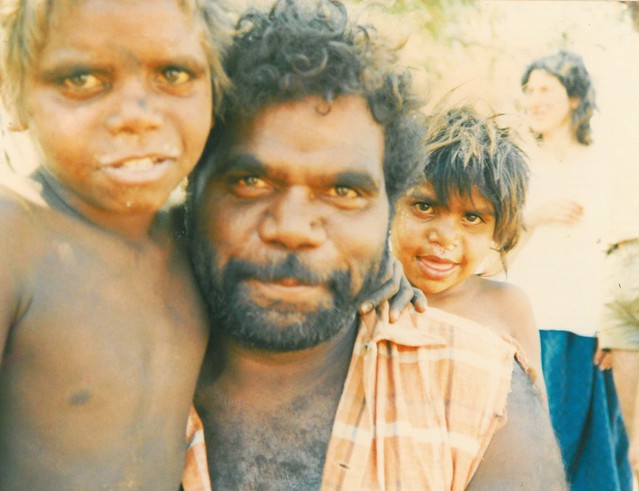On the first day it was my duty to fill the water tanks and on that occasion I met Sammy, Nganyinytja ’s son, 30 years old, “married” to four women (read: has sexual relationship with them within the kinship rules), two of them lived in Angatja. He is the father of four children, two of whom. Michael and Rosanna are with him in Angatja. When Sammy introduced me to some of the other members of the family, he called me “Malbo Wiro” – best friend.

Sammy has seen it all. He was a victim of the bad days. A drunk, spent three months in prison, no job, etc. It took Nganyinytja a lot of persuasion to convince Sammy to join her in Angatja. Last year, he finally arrived. Sammy “married” Celia some ten years ago. They have a son Michael (seven years old in 1988). A few years ago, he also married another woman, but she left him and according to tribal customs her parents gave him her sister Randy in exchange. It was in the middle of 1988 that their baby daughter Rosanna was born.
Celia attended High School in Alice Springs and comes from a different tribe near the Hermansburg Mission. She is well educated, cheerful and has a strong personality. Randy is much younger, less educated and is very shy. Celia looks after Randy’s daughter Rosanna.
It is remarkable how the kinship as described before is still very much alive in Angatja. Having a sexual relation does not mean that you are married. Having a wife does not mean that she or they are also sweethearts. Within this complicated structure there is plenty of space for falling in love and deep love relations This, however, is a personal choice and not regulated by kinship. But is still taking place within the kinship relations. Sammy told me that he loved all his wives, but I observed a more in-depth relation between himself and Celia.
As described before in Randy’s situation, the parents-in-law are of great importance within the Anangu kinship. Sammy had to follow several specified rules and had financial responsibilities towards these people.
Wages, grants, social security money all basically goes into one fund in Angatja from which payments are made. Ownership was and is in a lot of situations still foreign to the Anangu. It is for this reason that most Aboriginal enterprises are co-operatives. Very often they employ white people to run their business and this saves them the embarrassment of not having to “share” everything with their family members.
The dumping of rubbish and cars in the bush can be explained because of this ‘not my problem but everybody’s problem’. We (whites) have tried to make them aware of this – something we could contribute to the cross-culture exchange. We also simulated Nganyinytja’s and Sammy’s initiative to start a vegetable garden, another foreign element in their (nomadic) society. Unfortunately the dessert soil and the harsh climate is not very suitable for a vegetable garden so this project was not looking very hopeful. Also it was more Nganyinytja idea and Sam didn’t look to be all that interested. However, he was keeping up appearances for his mother.
We noticed the respect that the younger people showed to the older generation. During the hunting parties, Sammy told us several times to be quiet when the elders were talking. Before Sammy explained certain traditions to us: he would always first consult one of the elders.
It was also interesting to observe that the relationship between parents – children was less noticeable than the general relationship between three generations. Everybody was dad or mum, granddad or grandma.

Ngintaka and Malu – the hunting expedition